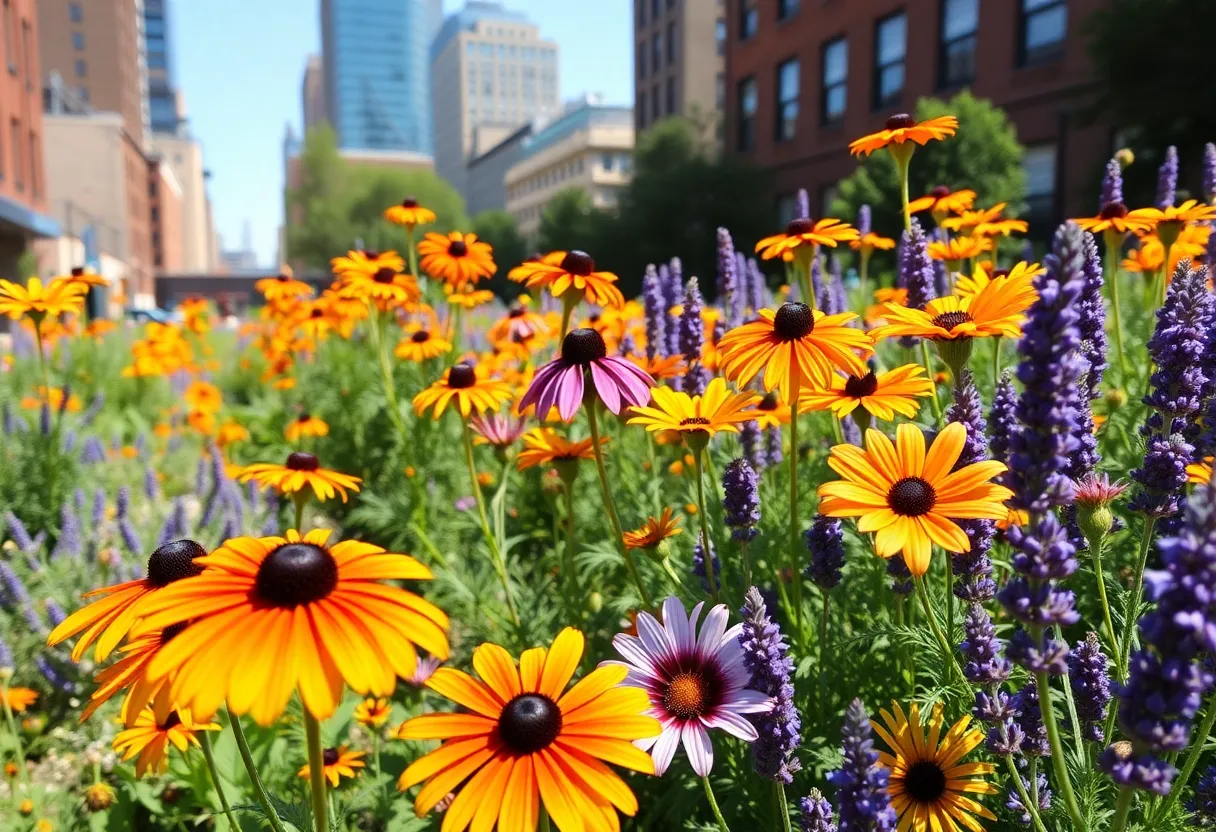10 Expert Tips for Growing an Abundant Flower Garden in Philadelphia
Developing a flourishing flower garden in Philadelphia demands a strategic approach tailored to the region’s specific climate and soil conditions. Implementing targeted techniques enhances success and ensures vibrant blooms across seasons. Here are ten essential tips to guide you through this process.
1. Select Native and Climate-Appropriate Plants
Optimal plant selection is foundational for a resilient garden. Prioritize native species because they are naturally adapted to the local environment, reducing maintenance needs and boosting ecological health. Incorporate perennials like:
- Black-Eyed Susans (Rudbeckia hirta): These durable flowers attract pollinators and flourish in Philadelphia’s climate.
- Daylilies (Hemerocallis): Available in various colors, they provide extended blooming periods and require minimal care.
- Lamb’s Ear (Stachys byzantina): Famed for its soft, silvery foliage, it adds textural contrast and withstands local conditions.
- Bee Balm (Monarda): An aromatic plant that attracts bees and butterflies, enhancing pollination.
- Lavender (Lavandula): Known for its scent and purple flowers, it’s ideal for borders and fragrant gardens.
Choosing native, climate-compatible plants ensures your garden can thrive with less intervention, supports pollinators, and fosters local biodiversity.
2. Prepare the Soil Properly
Healthy soil underpins garden success. In Philadelphia, soil varies in composition and fertility. Conduct soil testing to determine nutrient levels and pH balance. Amend soil with organic matter such as compost, aged manure, or peat moss to improve structure, drainage, and nutrient availability. Proper soil preparation promotes robust root systems, disease resistance, and vigorous growth.
3. Implement Efficient Watering Practices
Effective watering aligns with sustainability and plant health. Focus on:
- Enhancing soil moisture retention: Use organic fertilizers to improve water-holding capacity.
- Applying mulch: Organic mulches like bark or straw reduce evaporation, regulate soil temperature, and suppress weeds.
- Timing watering: Water early in the morning or late in the evening to reduce evaporation and maximize absorption.
- Choosing drought-resistant plants: Native species typically have increased drought tolerance, decreasing water dependence.
Adopting water-efficient techniques conserves resources while maintaining plant vitality.
4. Space Plants Appropriately
Accurate spacing ensures adequate air circulation, which mitigates disease risk and fosters healthy growth. Overcrowding hampers development and might lead to pest problems. Always refer to specific planting instructions for each species, considering mature size and growth habits, to optimize space use.
5. Practice Regular Maintenance
#Consistent care# sustains garden vitality. Essential tasks include:
- Deadheading: Removing spent flowers encourages prolonged blooming and maintains visual appeal.
- Weeding: Regularly eliminate weeds to prevent competition for nutrients and water.
- Pruning: Trim overgrown or damaged stems to promote healthy new growth and improve airflow within plant canopies.
Routine maintenance prevents pest outbreaks and encourages continuous flowering.
6. Utilize Vertical Gardening Techniques
In an urban landscape like Philadelphia, space constraints demand innovative solutions. Vertical gardening maximizes planting areas through structures such as trellises, hanging baskets, and wall planters. Cultivate climbing plants, vining flowers, or vegetables to add layers of visual interest and increase yield in small areas.
7. Protect Plants from Harsh Conditions
Philadelphia’s weather can be unpredictable, with temperature fluctuations and occasional storms. To safeguard your garden:
- Provide shelter: Plant near structures or use row covers to shield against wind and early or late frosts.
- Apply mulch: Mulches help insulate roots against temperature extremes.
- Monitor weather forecasts: Stay alert for upcoming adverse conditions to implement timely protective measures.
Proactive protection reduces damage and prolongs the lifespan of your plants.
8. Incorporate Companion Planting
**Companion planting** leverages plant interactions to improve health and pest resilience. For example:
- Marigolds deter pests such as nematodes and aphids when planted near vegetables and flowers.
- Nasturtiums attract aphids and other pests away from valuable plants.
- Herbs like basil or cilantro can repel specific insects or enhance flavor.
Choosing effective plant pairings reduces reliance on chemical controls, promotes growth, and balances ecosystem interactions.
9. Attract Pollinators
Pollinators are critical for flower reproduction and garden productivity. Strategies for attraction include:
- Plant a diverse array of flowers: Ensure a range of bloom times to provide continuous nectar sources.
- Provide water sources: Shallow dishes with stones offer resting spots for bees, butterflies, and hummingbirds.
- Avoid pesticides and chemicals: Use natural pest control methods to maintain pollinator health and encourage biodiversity.
Creating a pollinator-friendly environment enhances flower pollination, fruit set, and overall garden vibrancy.
10. Stay Informed and Adapt
Gardening practices must evolve with experience and local conditions. Stay engaged through:
- Monitoring local weather patterns and seasonal changes
- Attending workshops or participating in gardening groups
- Experimenting with new plant varieties or techniques based on observations
Continual learning and adaptation ensure your garden remains healthy, resilient, and abundant over time.
FAQs
What are the most suitable native plants for a Philadelphia flower garden?
Native options like Black-Eyed Susans, Daylilies, Lamb’s Ear, Bee Balm, and Lavender are highly adaptable and support local pollinators.
How can I improve my soil for better flowering?
Conduct soil tests and amend with organic matter such as compost or aged manure to enhance fertility, drainage, and structure.
What watering strategies are most effective in Philadelphia’s climate?
Water early in the morning or late in the evening, use mulch to retain moisture, and select drought-tolerant plants to conserve water.
How do I protect my garden during temperature extremes?
Use windbreaks, row covers, mulch, and structural shelters to insulate plants and mitigate damage from temperature fluctuations.
Can vertical gardening really maximize limited space?
Yes. Vertical structures such as trellises and wall planters enable efficient use of space, especially in urban areas, allowing more plants to grow in confined spaces.
Key Features of a Successful Philadelphia Flower Garden
| Feature | Description |
|---|---|
| Native Plants | Plants adapted to the regional climate for resilience and ecological support. |
| Soil Preparation | Amended with organic matter to foster strong root systems and nutrient uptake. |
| Water Management | Efficient watering times, mulching, and drought-tolerant species for sustainability. |
| Spatial Planning | Proper spacing and vertical techniques to optimize space and airflow. |
| Protection Strategies | Windbreaks, covers, and mulches safeguard against weather extremes. |
| Pollinator Attraction | Continuous flowering, water sources, and pesticide-free environment to draw beneficial insects. |
Author: STAFF HERE PHILADELPHIA WRITER
The PHILADELPHIA STAFF WRITER represents the experienced team at HEREPhiladelphia.com, your go-to source for actionable local news and information in Philadelphia, Philadelphia County, and beyond. Specializing in "news you can use," we cover essential topics like product reviews for personal and business needs, local business directories, politics, real estate trends, neighborhood insights, and state news affecting the area—with deep expertise drawn from years of dedicated reporting and strong community input, including local press releases and business updates. We deliver top reporting on high-value events such as Mummers Parade, Philadelphia Flower Show, and Thanksgiving Day Parade. Our coverage extends to key organizations like the Greater Philadelphia Chamber of Commerce and United Way of Greater Philadelphia, plus leading businesses in telecommunications, food services, and healthcare that power the local economy such as Comcast, Aramark, and Children's Hospital of Philadelphia. As part of the broader HERE network, we provide comprehensive, credible insights into Pennsylvania's dynamic landscape.





